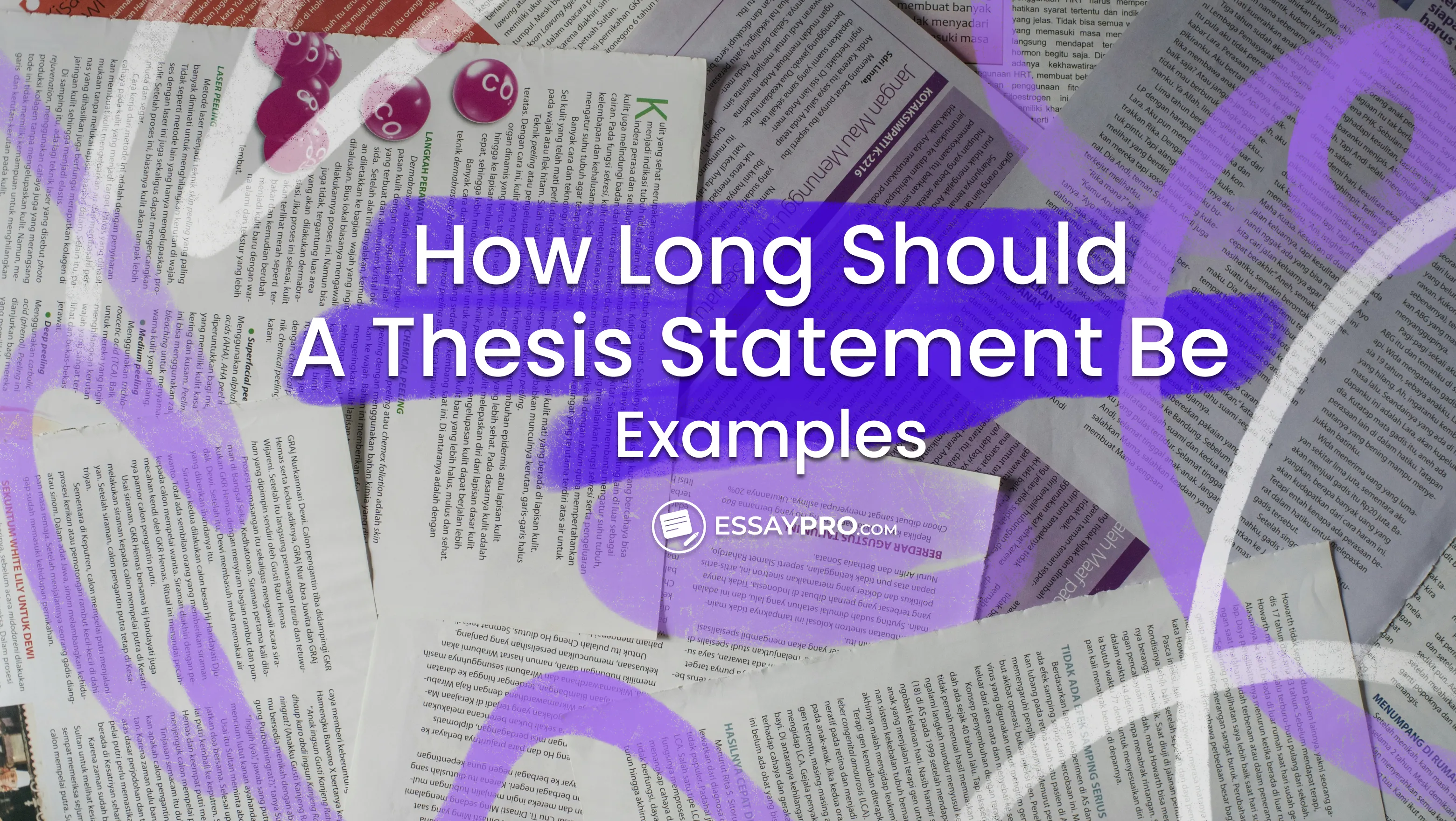How long your essay is decides the lengths of thesis statement. A short essay often works best with a thesis that runs one sentence. Every thesis belongs in the introductory paragraph, guiding the reader toward what the paper will argue.
If penning down that opening or just writing the paper itself causes you stress and anxiety, know that you don’t have to deal with it alone. EssayPro can help you create a clear essay with a strong thesis statement to fit your academic requirements. Just ask us - write my thesis, and we’ll take care of the rest.


Definition of a Thesis Statement
A thesis statement is one sentence that captures the basic idea of an essay or a research paper. It tells the reader what point of view the writer will argue or explain. A thesis statement will most often appear in the first paragraph and give a direct road to follow for the rest of the essay. Ultimately, the purpose is to tell the reader what your main argument is and how you’re going to develop that idea. Plus, a strong thesis can help you, the writer, too, by acting as a guide for what to include and what to leave out.
Thesis Statement Components
A thesis statement commits to a position sized to the essay and encoded in clear language. The sentence in your introductory paragraph should set the main idea and let the reader predict the plan of your paper.
A thesis statement includes:
- Focused response;
- Defensible claim;
- Defined scope;
- Logical thread;
- Specific wording;
- Reader cue;
- Plain structure;
- Accuracy check.
Weak thesis statement example: Access to clean water is an important issue for many communities.
The sentence names a topic without a claim, gives no scope, and sets no path for support or analysis.
Strong thesis statement example: In Arizona's rural counties, switching to lined ditches saves about 10% in annual water loss and allows for the reallocation of funds to maintain the wells that increase household access to water over the course of one planting season.
The statement answers a specific question, defines scope, and sets a testable pathway that later paragraphs can demonstrate with evidence.
How Long Is a Thesis Statement
The length of a thesis statement depends on your essay’s size and purpose. A short paper usually needs one sentence that directly states the main point. A longer or more detailed paper can use two sentences or slightly more to outline several connected ideas. Use these simple rules for thesis statement lengths:
- One-page essay: One sentence (about 20-25 words);
- Two to three pages: One or two sentences (around 30-40 words);
- Four to six pages: Two sentences (about 40-50 words);
- Long research paper: Two or more sentences (up to 60 words).
Can a thesis be two sentences? Yes. When your essay covers several main points or complex ideas, two sentences work best.
Short Thesis Statement Example
A short thesis works best for brief essays or assignments with a narrow focus. Here’s an example of thesis:
Regular physical exercise improves focus and mood in college students.
This thesis statement length is one sentence, which fits the standard thesis statement length for short essays of one to two pages. The statement sets up a specific argument without adding unnecessary details. Short theses like this suit reflection papers, summaries, and a short analytical essay example, where the argument stays simple and focused.
Long Thesis Examples
A long thesis is better for essays or research papers that explore several connected ideas. Here’s a long thesis statement paragraph example:
Online learning increases access to education for working adults, but it also creates challenges in motivation, time management, and digital literacy that schools must address through stronger student support systems.
This statement will work for longer essays that span several pages. A thesis of this length fits well in analytical or argumentative writing.
Thesis Statements of Various Lengths
Like we said earlier, thesis length depends on the type of paper. A single sentence, concise thesis is enough for a short essay. On the other hand, longer forms of writing, such as research papers, require longer thesis statements. Let’s look at the differences:
A one-sentence thesis for a short essay:
Fast food advertisements shape what kids eat and how they think about food.
A two-sentence thesis for an analytical essay:
Social media has changed how teenagers build friendships. While social media maintains those relationships, it also adds pressures and comparisons that can lead to negative self-confidence.
A two-sentence thesis for a persuasive essay:
Universities should offer free tuition to students from low-income families. Equal access to education enables students to become successful citizens and has a positive impact on the economy.
Multi-sentence thesis for a long research paper:
Climate migration is already happening. Rising sea levels are pushing coastal communities to move, which creates political tension, economic strain, and humanitarian challenges. These issues call for cooperation across borders and smarter global planning.
How to Write a Thesis Statement with Proper Length
The right word count of thesis statement depends on how deep your essay goes. Use the guide below to find the right balance.
The Bottom Line
By now you’ve probably figured out that there’s no universal answer to how long a thesis statement should be. It mainly depends on the academic paper length itself and the type of writing. But, no matter the length, a strong thesis must be precise and straightforward.
And if you ever face trouble while working on a paper, be it length or content, know that EssayPro has got your back with a thesis writing service when you need it most.
FAQs
How Long Is an Effective Thesis Statement?
Good thesis statements usually stay between 15 and 50 words. This range is enough for showing your main idea without writing a whole paragraph.
How Many Sentences Should Be in a Thesis?
One or two sentences usually. One sentence for a short essay, two sentences for a longer paper.
What Is an Example of a Good Thesis Statement?
Community-based recycling programs are more effective than national campaigns because they build personal responsibility and measurable local results.
Can a Thesis Statement Be 100 Words?
No, 100 words is too much for a thesis statement. Keep it under 60 words, otherwise you’ll lose your focus.
How Long Should a Thesis Statement Be in an Essay?
In most cases, an academic thesis statement is one or two sentences long and appears at the end of your introduction.

Adam Jason
is an expert in nursing and healthcare, with a strong background in history, law, and literature. Holding advanced degrees in nursing and public health, his analytical approach and comprehensive knowledge help students navigate complex topics. On EssayPro blog, Adam provides insightful articles on everything from historical analysis to the intricacies of healthcare policies. In his downtime, he enjoys historical documentaries and volunteering at local clinics.
- University of Maryland Global Campus. (n.d.). Thesis statements. UMGC Writing Center. https://www.umgc.edu/current-students/learning-resources/writing-center/online-guide-to-writing/tutorial/chapter2/ch2-10
- University of Waterloo, Writing and Communication Centre. (n.d.). Thesis statements. https://uwaterloo.ca/writing-and-communication-centre/thesis-statements
- University of Toronto. (n.d.). Thesis statements. Writing Advice. https://advice.writing.utoronto.ca/planning/thesis-statements/







